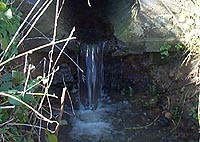Practices under microscope in water pollution trial

Farmers will be asked to trial different land management measures in a multi-million government project aimed at reducing agricultural diffuse water pollution while maintaining food production.
The DEFRA Demonstration Test Catchments (DTC) project will investigate whether adopting different farming practices reduces surface runoff into watercourses in a way that does not affect the economics of food production.
The £2.7m project is poised to start in England this summer in three river catchments – the Eden (Cumbria), the Hampshire Avon and the Wensum (Norfolk).
Scientists will be exploring measures infield and on farm, including buffer strips and beetle banks, which may reduce the environmental headache of soil movement and sediments flowing into watercourses.
It is hoped the project will build on the existing England Catchment Sensitive Farming Delivery Initiative to strengthen evidence for clear links between changes in farming practice and water quality issues.
For part of the project, monitoring equipment will be placed in water to record the chemical parameters of water quality with information relayed in real-time to a web server.
The data will then be analysed to see whether changes in on-farm measures contribute to shifts in trends of the most harmful water pollutants, including nitrates and phosphates.
Key findings will be used to inform national policies and meet compulsory targets under the European Water Framework Directive, which aims to achieve good ecological status by 2015.
Andrew Lovett, a professor from the School of Environmental Sciences, University of East Anglia, is co-leading the Wensum alliance.
He said the study, due to run until March 2014, was talking to farmers in the Wensum catchment about participating.
“We are trying to look at how farmers can improve land management and improve water quality in a way that does not impact on the economy of farming and food production,” he said.
If the scheme uncovers farming practices that can be adopted voluntarily to reduce diffuse pollution there is less chance of a compulsory scheme in the future, he added.
